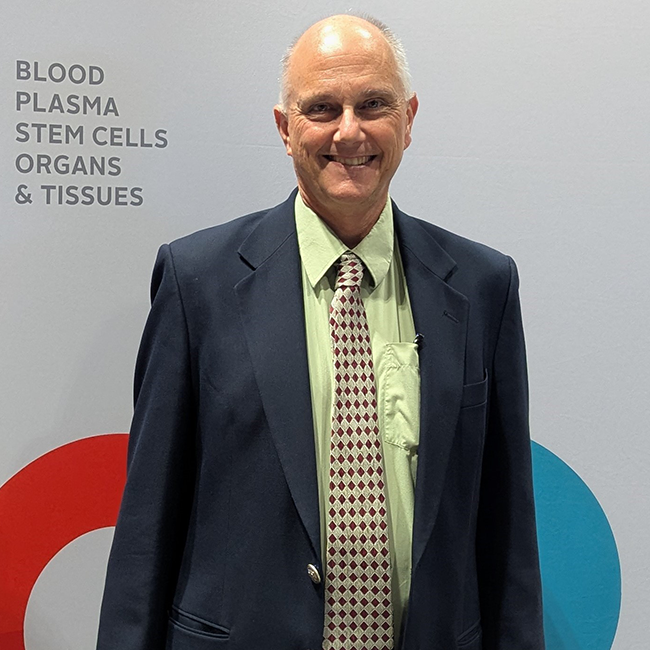Double distinction: 2025 QuidelOrtho & Canadian Blood Services’ Leadership Awards for Dr. Sheffield

Dr. William (Bill) Sheffield, Canadian Blood Services’ senior scientist and associate director of research, has been recognized with two awards: the Canadian Society of Transfusion Medicine’s annual QuidelOrtho Award and a 2025 Canadian Blood Services’ Leadership Award in recognition of his outstanding innovations and mentorship within transfusion medicine.

The 2025 QuidelOrtho Award
At the Canadian Society for Transfusion Medicine (CSTM) conference recently held in St. John’s, Dr. Sheffield was presented with the 2025 QuidelOrtho Award. This annual, nomination-based award recognizes a member of CSTM who has significantly contributed to a major service or innovation in the field of transfusion medicine.
In a lecture accompanying the acceptance of the award, Dr. Sheffield took the audience on a trip to the “SPA” while describing the various research activities that earned him this recognition.
The acronym SPA encapsulates the three focus areas of Dr. Sheffield’s research: Serpins, Plasma and Albumin. Serpins are a family of proteins involved in a variety of biological processes including blood clotting and inflammation. Plasma is the liquid component of blood in which you can find serpins and albumin. Albumin balances fluid levels between blood and organs and tissues and carries nutrients.
By rewiring proteins involved in blood clotting, Dr. Sheffield and his team are discovering new approaches for blood clot management. These re-wired proteins have the potential to benefit or prevent multiple conditions including acute traumatic coagulopathy (impaired blood clotting during excessive bleeding), heart attack and stroke. Dr. Sheffield’s research has also led to significant contributions in safeguarding and improving Canada’s plasma products.
In his award acceptance lecture, Dr. Sheffield also acknowledged the many family members, mentors, friends and colleagues who’ve supported him along this journey and inspired him to become the leader he is today.
The Canadian Blood Services’ Leadership award
Dr. Sheffield is also a recipient of a Canadian Blood Services’ 2025 Leadership Award. Throughout his 35 years of blood research experience at Canadian Blood Services and its predecessor, the Red Cross, Dr. Sheffield has proven to be an incredible leader and mentor. He is always ready to offer guidance – not only to his team of scientists but to colleagues across the entire organization.
In addition, Dr. Sheffield is a full professor at McMaster University in the department of Pathology and Molecular Medicine, where he uses these leadership skills to shape the next generation of transfusion scientists.
“Dr. Sheffield has a remarkable way of turning scientific chaos into clarity…and occasionally into comedy. His unwavering support and subtle humor have made even the most stressful experiments feel like part of a meaningful (and survivable) journey.”
– Sangavi Sivananthan, PhD candidate supervised by Dr. Sheffield.
Sangavi Sivananthan, a PhD candidate in the Sheffield Lab since 2021, has generated modified albumin proteins used to keep other anti-inflammatory proteins circulating in the blood for longer than before. This can be particularly useful in the genetic disorder hereditary angioedema, which is characterized by episodes of extreme swelling.
Sangavi emphasizes that one of the most important lessons Dr. Sheffield instills into his trainees is scientific integrity. By encouraging students to remain honest and rigorous in every aspect of their research, his commitment to high quality innovations is building a bright future for transfusion medicine.
Congratulations to Dr. Sheffield on these well-deserved honors!
Canadian Blood Services – Driving world-class innovation
Through discovery, development and applied research, Canadian Blood Services drives world-class innovation in blood transfusion, cellular therapy and transplantation—bringing clarity and insight to an increasingly complex healthcare future. Our dedicated research team and extended network of partners engage in exploratory and applied research to create new knowledge, inform and enhance best practices, contribute to the development of new services and technologies, and build capacity through training and collaboration. Find out more about our research impact.
The opinions reflected in this post are those of the author and do not necessarily reflect the opinions of Canadian Blood Services nor do they reflect the views of Health Canada or any other funding agency.